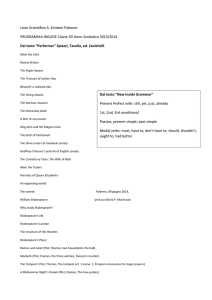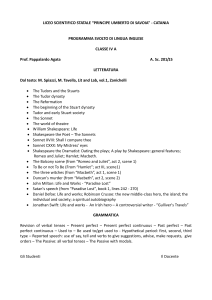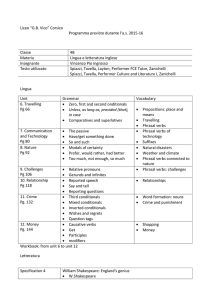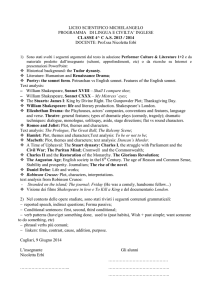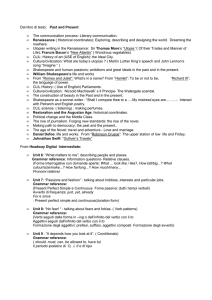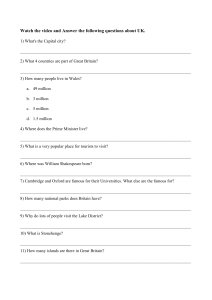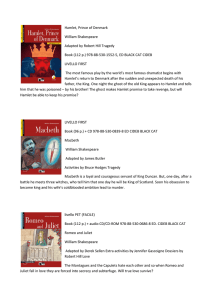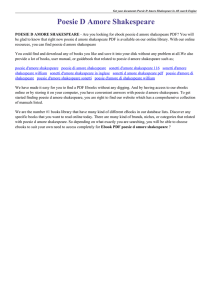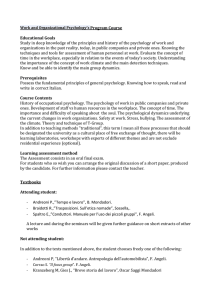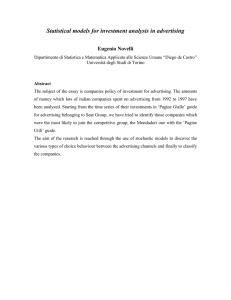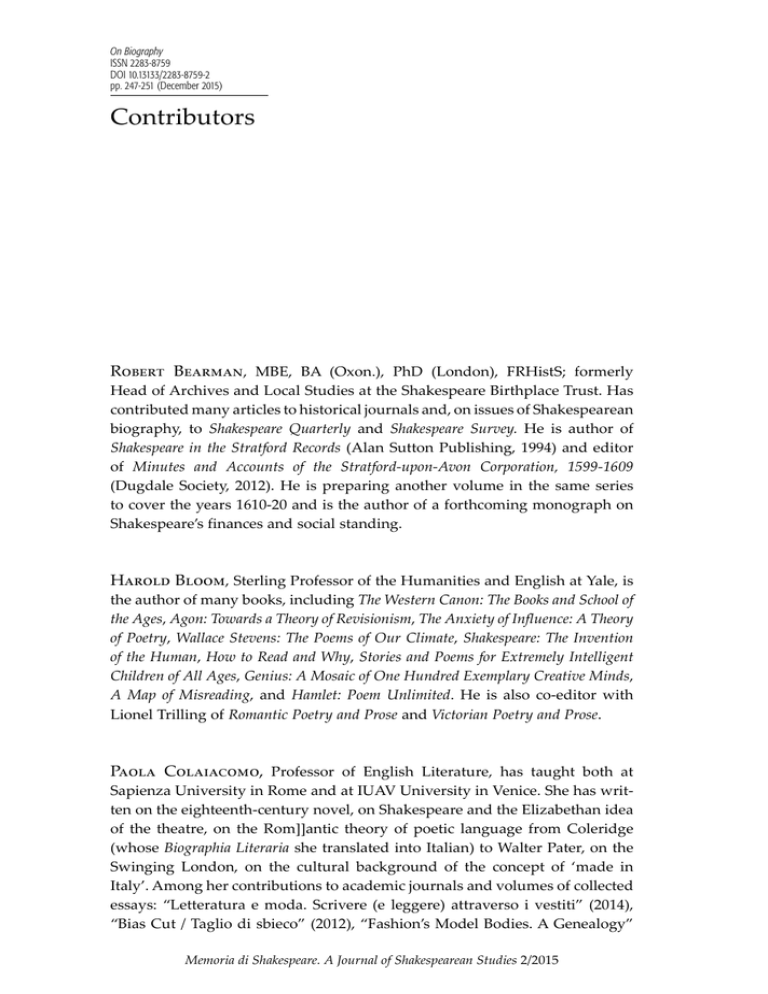
On Biography
ISSN 2283-8759
DOI 10.13133/2283-8759-2
pp. 247-251 (December 2015)
Contributors
Robert Bearman, MBE, BA (Oxon.), PhD (London), FRHistS; formerly
Head of Archives and Local Studies at the Shakespeare Birthplace Trust. Has
contributed many articles to historical journals and, on issues of Shakespearean
biography, to Shakespeare Quarterly and Shakespeare Survey. He is author of
Shakespeare in the Stratford Records (Alan Sutton Publishing, 1994) and editor
of Minutes and Accounts of the Stratford-upon-Avon Corporation, 1599-1609
(Dugdale Society, 2012). He is preparing another volume in the same series
to cover the years 1610-20 and is the author of a forthcoming monograph on
Shakespeare’s finances and social standing.
Harold Bloom, Sterling Professor of the Humanities and English at Yale, is
the author of many books, including The Western Canon: The Books and School of
the Ages, Agon: Towards a Theory of Revisionism, The Anxiety of Influence: A Theory
of Poetry, Wallace Stevens: The Poems of Our Climate, Shakespeare: The Invention
of the Human, How to Read and Why, Stories and Poems for Extremely Intelligent
Children of All Ages, Genius: A Mosaic of One Hundred Exemplary Creative Minds,
A Map of Misreading, and Hamlet: Poem Unlimited. He is also co-editor with
Lionel Trilling of Romantic Poetry and Prose and Victorian Poetry and Prose.
Paola Colaiacomo, Professor of English Literature, has taught both at
Sapienza University in Rome and at IUAV University in Venice. She has written on the eighteenth-century novel, on Shakespeare and the Elizabethan idea
of the theatre, on the Rom]]antic theory of poetic language from Coleridge
(whose Biographia Literaria she translated into Italian) to Walter Pater, on the
Swinging London, on the cultural background of the concept of ‘made in
Italy’. Among her contributions to academic journals and volumes of collected
essays: “Letteratura e moda. Scrivere (e leggere) attraverso i vestiti” (2014),
“Bias Cut / Taglio di sbieco” (2012), “Fashion’s Model Bodies. A Genealogy”
Memoria di Shakespeare. A Journal of Shakespearean Studies 2/2015
248
On Biography
(2011), “Indossare una corona” (2010), “Other from the Body: Sartorial
Metatheatre in Shakespeare’s Cymbeline” (2009). Factious Elegance. Pasolini and
Male Fashion (Marsilio, 2007) and Le cuciture dell’acqua. Shakespeare alle origini
del corpo moderno (Bulzoni, 2012) are her most recent books.
Rosy Colombo is Senior Professor of English at Sapienza University of
Rome, where she was also Director of the Graduate School in Literatures
in English from 2003 to 2009. She was Visiting Professor at Columbia
University in 1980 and at the University of Reading in 1998. She was a
member of the national journal rating agency ANVUR until 2014 for the
area of English Literature and Language. She has edited and introduced
the Lombardo-Strehler correspondence (W. Shakespeare, G. Strehler, A.
Lombardo, La Tempesta tradotta e messa in scena: un carteggio ritrovato e due
traduzioni inedite, Donzelli, 2007), as well as Agostino Lombardo, Lettura
del Macbeth (Feltrinelli, 2010). She has been the general editor of Memoria di
Shakespeare since 2008, and has dedicated herself in particular to the authorship question in a special issue published in 2012; she is a founding member
of SPSS, a permanent Shakespearean seminar co-convened by the three State
universities of Rome. Besides Shakespeare, her research interests include
eighteenth-century studies, women’s poetry and fiction, Romantic closet
drama, Samuel Beckett. Amongst her most recent studies: “Closet Drama on
the Stage of Revolution: Language on Trial in The Borderers”, in The Romantic
Stage, eds Lilla Maria Crisafulli and Fabio Liberto (Rodopi, 2014), and (with
Davide Crosara) “Fantasie e parodie del cibo nell’opera di Samuel Beckett”
(Fictions, 2015).
John Drakakis is an Emeritus Professor in English at the University
of Stirling, and he holds visiting professorships at Glyndwr University
(Wrexham) and at the University of Lincoln. He is the general editor of
the Routledge New Critical Idiom series, and he is the general editor and
contributing editor to the forthcoming revision of Geoffrey Bullough’s
Narrative and Dramatic Sources of Shakespeare. He has produced an edition of
Shakespeare’s The Merchant of Venice for the Arden 3 series, and he has edited
collections of essays on Shakespearean Tragedy, Tragedy, Alternative Shakespeares
and Radio Drama. He has contributed many reviews and articles to learned
journals, and he has been invited to write a number of book chapters in
collections edited by others. He is a Fellow of the English Association, and
a member of the Academia Europaea, and he holds honorary degrees from
Glyndwr University, and Blaise Pascal University. He has just completed
ten years as a founder member of the Trustees of the British Shakespeare
Association, and he has also chaired the Association’s Honorary Fellowships
Memoria di Shakespeare. A Journal of Shakespearean Studies 2/2015
Contributors
249
sub-committee. He has been a member of appraisal panels for the AHRC,
and was also a member of the Council’s Peer Review College. He is currently
a member of the Carnegie Trust Peer Review College.
David Ellis is Emeritus Professor at the University of Kent. His interests span
the literature of the early twentieth century, D. H. Lawrence, Shakespeare, the
nature of autobiography and biography, theories of comedy, comic characters
in Shakespeare, Stendhal. His most recent publications include Memoirs of a
Leavisite: The Decline and Fall of Cambridge English (Liverpool University Press,
2013), The Truth about William Shakespeare: Fact, Fiction and Modern Biographies
(Edinburgh University Press, 2012), Byron in Geneva: That Summer of 1816
(Liverpool University Press, 2011), Death and the Author: How D. H. Lawrence
Died, and Was Remembered (Oxford University Press, 2008).
Nadia Fusini is Full Professor of Comparative Literature, Scuola Normale
Superiore, Pisa. She previously held the chair of Shakespearean Criticism at
Sapienza University of Rome. She has translated and written extensively on
Virginia Woolf, Shakespeare, John Keats, Samuel Beckett, Mary Shelley, and
many others. She is the Director of the Piccola Biblioteca Shakespeariana for
Bulzoni Editore and of the Feltrinelli series of Shakespearean translations
into Italian, for which she has translated and edited A Midsummer Night’s
Dream (2006), Much Ado about Nothing (2009), All’s Well That Ends Well (2012).
She is the author of the biographical novel on Elizabeth I Lo specchio di
Elisabetta (Mondadori, 2001). Her most recent books include Di vita si muore.
Lo spettacolo delle passioni nel teatro di Shakespeare (Mondadori, 2010), La figlia
del sole. Vita ardente di Katherine Mansfield (Mondadori, 2012), and Hannah e
le altre (Einaudi, 2013).
Stephen Greenblatt is John Cogan University Professor of the Humanities
at Harvard University. His research interests include Shakespeare and early
modern literature and culture, the literature of travel and exploration, religion and literature, literature and anthropology, literary and cultural theory.
Selected publications include The Swerve: How the World Became Modern
(2011), Shakespeare’s Freedom (2010), Cultural Mobility (2010), Will in the World
(2004), Hamlet in Purgatory (2001), Practicing New Historicism (with Catherine
Gallagher, 2000), New World Encounters (editor, 1993), Marvelous Possessions
(1991), Learning to Curse (1990), Shakespearean Negotiations (1988), Renaissance
Self-Fashioning (1980). He served as general editor of The Norton Anthology of
English Literature (2000) and The Norton Shakespeare (1997).
Memoria di Shakespeare. A Journal of Shakespearean Studies 2/2015
250
On Biography
Andrew Gurr, a New Zealander, is Professor Emeritus at the University
of Reading, and former Director of Research at the Shakespeare Globe
Centre, London. He spent more than twenty years at the new Globe chairing the committee that decided on the Globe’s shape and structure. He
subsequently helped design the shape of the Sam Wanamaker Playhouse.
The idea of having both a summer and a winter venue, based on the intention of the Shakespeare company, dating from their first months of existence
in 1594, was a scheme that, in league with John Orrell, he first persuaded
Sam to take on in 1984. He is also currently a Trustee of the Rose Theatre
Trust. He has written more than twenty academic books, and hundreds of
articles. His books on theatre history include The Shakespearean Stage, 15741642, now in its fourth edition, Playgoing in Shakespeare’s London, now in its
third, The Shakespearean Playing Companies, The Shakespeare Company, 15941642, Staging in Shakespeare’s Theatres (written in collaboration with Mariko
Ichikawa), and Shakespeare’s Opposites: The Admiral’s Men, 1594-1625. He
has also edited Shakespeare’s Richard II and Henry V, and three plays by
Beaumont and Fletcher.
Graham Holderness has taught at the universities of Oxford, Swansea,
Roehampton and Hertfordshire. Most of his forty published books focus
on Shakespeare, with particular interests in Shakespeare’s history plays,
Shakespeare and the media, Shakespeare editing, Shakespeare and contemporary culture, and transnational Shakespeare. Recent publications include
Shakespeare in Venice (Ashgate, 2009) and Nine Lives of William Shakespeare
(Bloomsbury, 2011). Influential publications include: D.H. Lawrence: History,
Ideology and Fiction (1982), The Shakespeare Myth (1988), Shakespeare: The
Histories (2000), and the trilogy Cultural Shakespeare: Essays in the Shakespeare
Myth (2001), Visual Shakespeare: Essays in Film and Television (2002), and Textual
Shakespeare: Writing and the Word (2003).
Donatella Montini teaches English Language and Translation at Sapienza
University of Rome. She is the author of I discorsi dei re. Retorica e politica in
Elisabetta I e in Henry V di Shakespeare (1999) and Le lettere di Shakespeare (1993).
Her research interests include stylistics and narratology (The Language of
Fiction, 2007), correspondence and letter-writing (Lettere su Clarissa. Scrittura
privata e romanzo nell’Epistolario di Samuel Richardson, 2009), political discourse in a synchronic and diachronic perspective (Visione politica e strategie
linguistiche, 2010). In the area of early modern studies, her current research is
focussed on John Florio and she has published several articles on the influence
of his didactic dialogues and translations in the history of English (John Florio.
Biographia Linguistica, forthcoming).
Memoria di Shakespeare. A Journal of Shakespearean Studies 2/2015
Contributors
251
Gary Taylor is a Distinguished Research Professor of English at Florida
State University, and general editor of the New Oxford Shakespeare edition of
Shakespeare’s Complete Works (forthcoming in 2016). He also general edited
the prize-winning Collected Works of Thomas Middleton (2007), and the previous
Oxford edition of Shakespeare’s Works (1986-2005). He has written extensively
about Double Falsehood and The History of Cardenio in two collections: The Quest
for Cardenio (Oxford University Press, 2012) and The Creation and Re-creation
of Cardenio (Palgrave, 2013).
Memoria di Shakespeare. A Journal of Shakespearean Studies 2/2015


